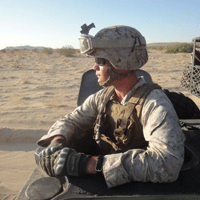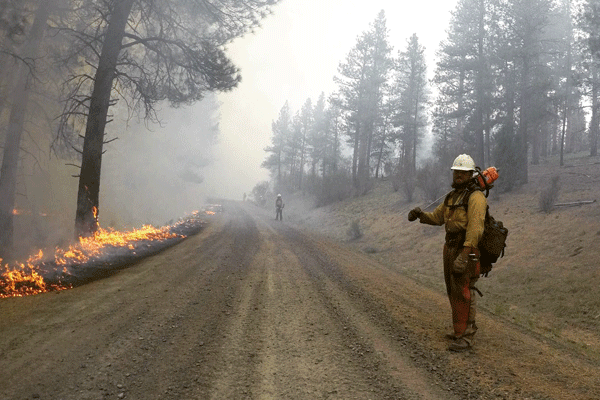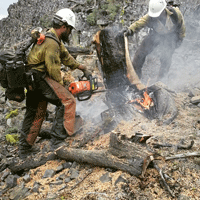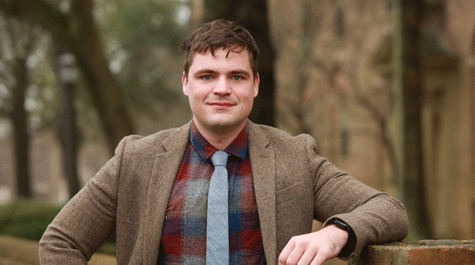Marine, firefighter, doctor: W&M grad follows unconventional path
It’s OK to find your way as you go, and most importantly to decide what’s right for you in your own time, according to Evan Kikla ’21.
Kikla will graduate from William & Mary on May 23 as part of Commencement weekend. His journey to his degree was circuitous, unlikely and entirely his own.
Kikla went from a less-than-stellar high school student who moved around as part of a Navy family to the Marine Corps, wildland fire fighting out West and then to William & Mary to study biology. He will enter medical school in the fall.
“The journey I took to get to where I am was kind of winding and circuitous,” Kikla said. “It was a winding, kind of not really focused journey. But I would say that the biggest thing about me was the ability to always keep moving forward and accepting challenges and not letting people tell me which direction to go or what’s the safe option.
“And I would say that I would like to encourage all students, and especially all veteran students — you don’t have to be on a time line and you don’t have to do what everyone else wants you to do."
Marine Corps seemed natural
After graduating from high school in Maryland more than 10 years ago, Kikla decided to join the Marines.
 “Both of my parents were naval officers, so I grew up with it,” Kikla said. “I was also a really bad high school student. And then I had lived in the Middle East when I was a kid, in Bahrain in the pre-9/11 Middle East. And having experienced Marines when things like the USS Cole got bombed. So it was something that really stuck out with me.
“Both of my parents were naval officers, so I grew up with it,” Kikla said. “I was also a really bad high school student. And then I had lived in the Middle East when I was a kid, in Bahrain in the pre-9/11 Middle East. And having experienced Marines when things like the USS Cole got bombed. So it was something that really stuck out with me.
“So when I turned 17, that was in 2009 so that was as we were ramping up in Afghanistan. It seemed really natural to enlist in the Marine Corps infantry.”
He served as a rifleman from 2009 to 2014, which included stints in Yorktown from 2010 to 2012 and Twentynine Palms, California, from 2012 to 2014. Kikla spent time as a marksmanship instructor with the Twentynine Palms marksmanship training unit and competed on the Twentynine Palms base shooting team. During his time in the Marines, he was deployed to Guantanamo Bay, Cuba, as well as Yokosuka and Okinawa, Japan.
Fire fighting was spur of the moment
Leaving the military in mid-2014, Kikla’s plan of going to college for business or something similar and getting a job didn’t seem like it was going to work for him.
“Getting out of the military’s a very difficult thing,” Kikla said. “You enter a world that has a completely different value system, and all my friends were out in California on the other side of the country. I just found myself really isolated. I bounced around a little bit, and I wasn’t able to get into any of the colleges I had applied to, including William & Mary, because of my bad academic background.”
He felt like he was going to waste his GI Bill going to community college to study something he wasn’t all that interested in and dropped everything all at once. Running across an ad online for an AmeriCorps conservation crew in Colorado that was recruiting veterans to train in wildland fire fighting, Kikla decided to give it a try.
 “And it seemed like the closest thing in the civilian world to my Marine experiences,” he said. “So I applied to that. They called me and said: ‘Hey, can you be out here in four days?’ And I said ‘Sure,’ and I just drove out to Colorado to join this conservation corps.
“And it seemed like the closest thing in the civilian world to my Marine experiences,” he said. “So I applied to that. They called me and said: ‘Hey, can you be out here in four days?’ And I said ‘Sure,’ and I just drove out to Colorado to join this conservation corps.
“And it was a great time. It was a bunch of us vets just living out in the woods. We lived out of our cars for six months. We got a really measly living stipend, and so we couldn’t afford housing. I got to do all kinds of cool stuff out in the woods like learn how to cut down trees and stuff.”
 After completing that training, Kikla applied for federal fire fighting jobs and landed on Lakeview Crew 7 with the Bureau of Land Management in Klamath Falls, Oregon. It’s one of several all-veteran crews with the bureau and would become the Lakeview Hotshots and the first all-veteran hotshot crew in the country after Kikla’s first season with them in 2015.
After completing that training, Kikla applied for federal fire fighting jobs and landed on Lakeview Crew 7 with the Bureau of Land Management in Klamath Falls, Oregon. It’s one of several all-veteran crews with the bureau and would become the Lakeview Hotshots and the first all-veteran hotshot crew in the country after Kikla’s first season with them in 2015.
“Hotshots are the highest echelon of wildland firefighters; I was actually really proud to be a part of that,” he said.
Still wanting to go to college, Kikla attended the spring semester at Fort Lewis College in Durango, Colorado, in 2017 to get his grades up. He then worked the fire season after that and was accepted and started at W&M in the spring of 2018.
University prepared him for next step
He had decided to study biology in preparation for becoming a doctor and would take two leaves of absence from the university to return West for short-term stints to fight fires during his time in Williamsburg.
“I was introduced to William & Mary as a Marine,” Kikla said. “I was stationed in Yorktown for two years, and I would go into Williamsburg to escape all the other Marines. I would hang out at Aromas and read books.
“Because when you’re a junior Marine, you don’t want to see your NCOs out in town. And I was like ‘None of these guys will show up in Williamsburg.’ So from that experience, everyone I talked to back then — this was like 2010 — said, ‘William & Mary is such a rigorous school. It’s so hard to get into. It’s where all the smart kids go.’”
Not particularly interested at the time, Kikla had thought the campus was pretty. He also liked the idea of the university’s challenging academic standards and history.
“When I got interested in medicine, I guess that started in the Marines and as a fire line EMT,” Kikla said. “And medical school became my objective; it was like I want the best education that I could get to prepare me to apply to medical school.
“And William & Mary seemed to fit a lot within the culture that I had been in the Marine Corps and in fire fighting where it was uncompromising in its rigor. And as someone who understood implicitly that actually the harder the challenge, the better it makes you, I was like I’m not as worried about my GPA; I want the best underlying education I can get so that I can maximize doing well on the MCAT and then further on in medical school.”
That was a lot of what drew him to W&M. During an exceptionally bad fire season in 2018 and again in 2019, he took three-week and one semester breaks to help his crew fight fires in Washington, making that a consistent part of his college experience.
“And it turned out to be the case,” Kikla said. “I think that the education here is really, really strong. I’ve only really experienced a lot of the science stuff, but it is rather uncompromising. The standards are really high, and a lot of these kids are very competitive.
“And a lot of being on a hotshot crew is everyone’s driving each other to be better because you just have to compete on a curve. And it’s pretty much the same thing here.”
Kikla got outstanding grades and did well on the MCAT, which led to his acceptances to several medical schools. Using his GI Bill to attend W&M gave him ownership.
“I could very easily waste what was a really good opportunity that was difficult to earn,” Kikla said. “I didn’t want to do that, so when I decided to return to education it was with a very focused mindset and (I was) determined to use my GI Bill well. … I was trying to go for medicine, and I could totally burn my GI Bill by failing to get into medical school. I had to be all in.”
His biggest concern coming back to W&M was how to adjust socially and finding a veterans network.
“There isn’t a huge population of vets or non-traditional students at William & Mary, but they do exist,” Kikla said. “I was able to make a decent number of friends that were people that shared similar experiences and stuff. So we have a veteran office, and they were able to connect me with some people and that was really nice, and one of them’s my roommate now. So we’re both applying for med schools.
“I didn’t have a problem coming in here and finding my own niche and adjusting and being successful.”
Medical field combines interests
Looking to the future, Kikla is particularly interested in focusing his medical career on military members. He likes rural environments and feels veterans are fairly under-served, so he would like to combine those interests.
“So whatever kind of gives me the best opportunities to interact with both the patients that I would like to work with eventually and also work in the settings that I would like to work,” Kikla said. “So that’s really anything from internal medicine to a lot of the surgical specialties, anesthesiology, things like that.”
Knowing his path found its own way in due time, Kikla emphasized that he wants students to understand you have to find your own way and answers aren’t always readily apparent.
“When I joined the Marine Corps it wasn’t standard practice for everyone in high school to join the military in a time of war, and then when I got out it wasn’t standard practice for every veteran to go fight wild fire fighters,” Kikla said.
“And then when I was fighting wild fires and I said I’m going to go to school, everyone there said: ‘Why would you do that?’ I would say a big part of what I would like people to be encouraged to do is to follow what they think their best options are and to not let people tell them that they can’t do things.”















